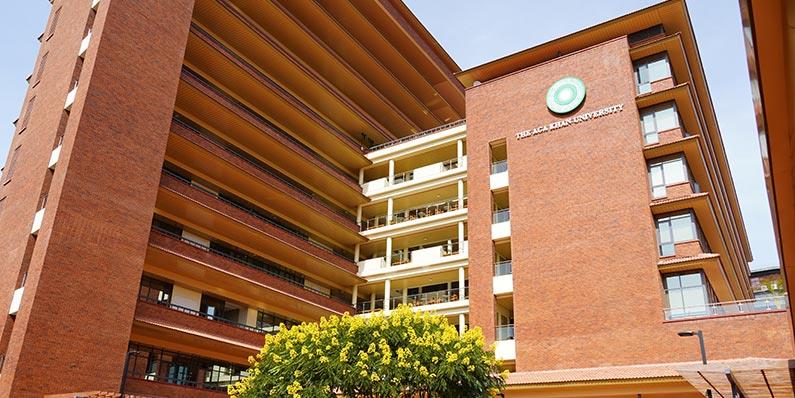Reduce energy use in buildings
Energy consumption in buildings
AKU’s GHG accounting has shown that most emissions result from energy use in buildings.
With growing campuses, AKU is mindful of improving energy use in its buildings, through design, construction and operations. Several so-called ‘passive measures’ are already standard in many AKU buildings, including:
-
Building exteriors that emphasise materials such as terracotta tiles on roofs that have a natural insulation effect. The Karachi Stadium Road campus’ iconic ‘weeping plaster’ casts small shadows on the wall, cooling the building.
-
Building interiors such as the long corridors allow for natural ventilation while set-back windows reduce direct sunlight.
Measuring progress in buildings
Energy audits are carried out on AKU sites on regular basis, highlighting areas of energy use as well as options for energy conservation measures. AKDN Green Building Guidelines, approved in 2021 set out a number of requirements for building efficiency over the coming years:
-
Net zero carbon emissions standards to be met for all large new buildings.
-
Bringing at least 5 percent of the building square meterage to net zero carbon standards per year.
-
Implementing energy conservation measures with a payback period of less than 10 years.
Behaviour change
While buildings can become more energy efficient, changes made by users can have a very large impact on energy use. AKU is working with the University community - students and faculty – to remind them of the role they can play in meeting zero carbon goals.
Green Building Certification
In 2022, the Aga Khan University Centre in Nairobi has achieved EDGE Advanced certification for its multiple sustainability features. EDGE Advanced requires that at least 40 percent energy is saved in the building operation in contrast to an average new construction in the respective area, and at least 20 percent savings in both water and embodied energy in materials. The learnings from this process are now being applied to other AKU buildings.
In May 2023, the University Centre in Nairobi also won a Green Building Award at the 19th Energy Management Awards in Kenya.

Several further buildings are currently being assessed through the EDGE process.
Energy efficiency
Energy efficiency makes business sense, as reduced energy consumption results in cost savings and measures have already been taken.
Since 2017, AKU's energy use on its largest campus, the Stadium Road campus in Karachi, has been held relatively stable despite the addition of a large number of new buildings.
Efficiency of appliances has been set as a new standard for many common items such as inverter ACs, LED lights and laptops.
Buildings are being upgraded to be more energy efficiency, e.g. by replacing numerous Fan Coil Units with fewer and more efficient Air Handing Units, adding window film to reflect sun light and heat, as well as reducing cooling to office spaces in terms of timing and temperature.
AKU facilities teams continue to measure energy consumption in detail to guide best decision making and efficiency gains in the provision of energy on the University's campuses. This is complemented with up-to-date building management systems, technology upgrades and the capacity development of teams.

